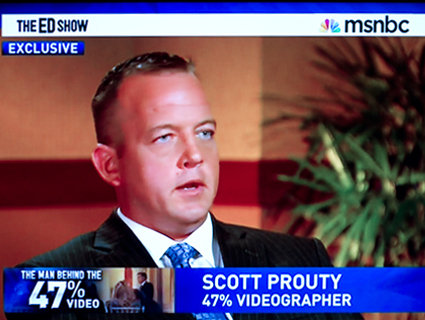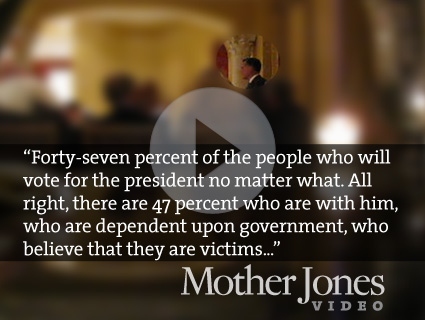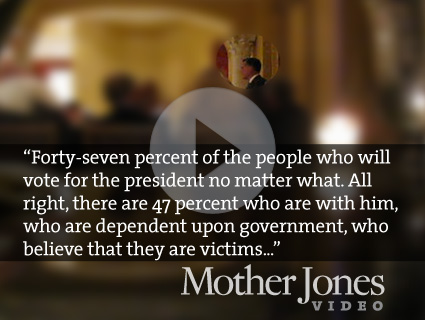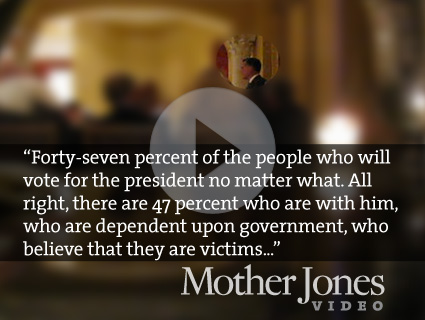
“Scott Prouty.”
The fellow on the other end of the phone call pronounced his name with hesitation. For nearly a fortnight, he and I had been building a long-distance rapport via private tweets, emails, and phone conversations as we discussed how best to make public the secret video he had shot of Mitt Romney talking at a private, $50,000-per-plate fundraiser in Boca Raton, Florida. Now I was almost ready to break the story at Mother Jones. I had verified the video, confirming when and where it had been shot, and my colleagues and I had selected eight clips—including Romney’s now-infamous remarks about the 47 percent of Americans he characterized as “victims” unwilling to “take personal responsibility and care for their lives”—to embed in two articles. We had blurred these clips, at the source’s request, to make it difficult to tell where Romney had uttered these revealing comments, while clearly showing that it was Romney speaking. The goal was to afford the source a modicum of protection.
The source was justifiably worried about repercussions. Once the video was posted, he might lose his job. He might face criminal prosecution or a civil lawsuit. Months earlier, he had anonymously posted a snippet from the video, in which Romney nonchalantly described the work-camp-like living conditions at a Chinese factory he had visited. The source, offended by these comments, had hoped that the short clip would catch fire in the political-media world. But it hadn’t, partly because its context and origins were unknown. The source’s desire to remain in the shadows had hindered his ability to bring the story to the public.
Then James Carter IV, a freelance researcher (and, though I didn’t know it then, the grandson of Jimmy Carter) who had been sending me public documents regarding Romney’s prior business investments, had, at my request, tracked the anonymous poster down. I subsequently persuaded him to send me the full video of the fundraiser and to allow me to release portions of it, under the strict condition that I’d do whatever was possible to keep his identity hidden. He did not want to become the story. He hoped the public would focus only on Romney’s words. And through all this, he had not told me who he was, though he disclosed that he had worked at the fundraiser and insisted that he was no political partisan and had filmed Romney more out of curiosity than as part of a plan to trap the GOP candidate.
I respected his desire for privacy. He was about to commit a courageous and unprecedented act of whistle-blowing. But as we neared publication, I said I had to know his name. Do you really need it? he asked. Yes, I replied, explaining I could not publish the stories without knowing his identity. I vowed I would keep it a secret.
I had waited until the final moments to press him on this. I realized there was a chance that he might decline to identify himself, and the story would die. He asked once more if it was necessary. I said it was and held my breath. There was a long silence. “Scott,” he said. “Scott Prouty.” Thank you, I replied. Then we moved on to other details.
When I got off the phone, I did the obvious: I Googled him. The initial results were worrisome. I found mug shots for two men with that name who had been arrested. But then I located a proclamation (issued by the mayor and town council of Davie, Florida) that the source had mentioned earlier. On September 25, 2005, a car had plunged into a canal along I-75 and sunk into the water. Prouty, then working at motorcycle dealership, rushed to the scene. A tall fellow with a strapping build, Prouty jumped into the water and, using a knife provided by a fellow employee, cut the seatbelt, freed the unconscious woman in the driver’s seat, and handed her to a coworker who revived her with CPR. Prouty, who had noticed there was a child safety seat in the car, kept diving into the dark water in search of a child. But there had been no one else in the car. The proclamation noted that Prouty and two of his coworkers had taken “valiant and swift lifesaving actions in the face of an emergency without thought to their own safety” and declared them “lifesaving heroes.” I also found a local newsletter with a photo of Prouty and his colleagues being honored by the Weston City Commission for their heroism (his name was misspelled “Proudly”). The picture did not match either of the mug shots, and I saw that one of the other Proutys was incarcerated in Wisconsin, while the other seemed to be from a different part of Florida. I was relieved. I would later learn that my source was a college-educated bartender, in his late 30s, who had grown up in the Boston area.
Days later, we published the first article. It went hyper-viral. The 47 percent story quickly became bigger than Prouty and I had expected. Realizing he could not keep hidden the location and date of what was becoming the most notorious fundraiser in modern history, Prouty gave me permission to reveal those details, to remove the blurring from the videos we had posted, and to release the entire video he had sent me. This will make it easier for someone to track you down, I said. If they want to find me, he replied, they will.
You know the rest. The story generated a meme and changed the political landscape. For nearly two weeks, it dominated the presidential race. Romney offered conflicting responses and explanations. And Prouty watched from the sidelines as millions of people wondered who had shot this video.
There was much speculation. One well-known journalist repeatedly informed me that he knew the source was a woman and requested that I put him in touch with her. One widespread assumption was that the source had worked at the event. I knew that to be true—he had been tending the bar that night—and I realized that he had put his livelihood at risk. But when asked about the source, I said nothing that might indicate whether he had attended the fundraiser as a donor, a companion of a donor, or a worker.
In the weeks afterward, Prouty and I discussed whether he should reveal himself. It was a rough time for him. He thought his boss suspected he was the undercover videographer; his job was in jeopardy. He was worried about paying the monthly rent on his apartment. He feared retribution. One night I told him, half-jokingly, that an unknown dark sedan was parked in front of my house. He replied that he had spotted a car on his street that had raised his suspicions. We finally met in person, at a diner in New York City, and the question of going public dominated the conversation. There were reasons to remain silent and reasons to tell the world. Marc Leder, the host of the fundraiser, had made some noise about filing a civil lawsuit against the maker of the video. That might well have been a bluff, but Leder, a private equity billionaire, had the money and lawyers to file a suit, if only to harass Prouty, and he could keep up the pressure for years.
There was also the question of possible criminal prosecution. Florida law requires both people to consent when a private conversation is taped. But would this cover a presidential candidate speaking to a room full of people? In any event, a smart lawyer would give the obvious advice: Shut up and keep your head low.
And there was this: If Prouty did claim credit, he would immediately become a target of the right, especially during the campaign. He could expect an effort to smear and discredit him.
But it was also natural for Prouty to want to accept the many accolades flowing to the mystery videographer. Why not come forward and enjoy the moment? There might be a financial benefit, or, better yet, an opportunity to enhance his career prospects. He was interested in going back to school or working in public policy. Donations or other assistance might materialize. Some media outlets were looking to make offers.
In the course of our ongoing discussions, I said I would support him, whatever he did. I did point out that were he to reveal himself, he could expect forces on the right to dig up whatever dirt could be found on him, his friends, and his family—or to make stuff up. I had no idea if this was a real concern, but I wanted him to consider the possibility. As he pondered his options, he repeatedly told me that he did not want to distract from the impact of his video. And he meant it.
After the election, the dynamics changed slightly. Prouty no longer had to fret about any possible retribution from a Romney administration. But the fundamentals remained. Going public would bring cheers and perhaps rewards but also place him in the crosshairs. I was frequently asked whether I thought my source would out himself. I answered that I could envision him remaining a ghost for the next 20 years, or deciding to hold a press conference the next day. I got the sense that he was living with a tough choice—and thinking about it—every day.
On a daily basis, I thought about what it was like to hold such a secret. No doubt, Prouty had been in conversations about the 47 percent video. How strange that must have been. How great the temptation to say, “That was me.” People who knew he was at the fundraiser might have asked whether he was the guy. How did he respond? It was odd to share a big-time secret, though certainly much more difficult for him. After all, I was receiving plenty of attention, and he deserved the same—if he wanted it.
In the middle of all this, I read Bob Woodward’s The Secret Man, his account of his relationship (and sometimes lack thereof) with Deep Throat, the legendary Watergate source. Woodward published the book after former FBI official Mark Felt, via his family, outed himself in 2005 as the man who’d provided late-night tips and guidance to Woodward in a Washington-area parking garage. At that point, Felt, who had previously denied being Woodward’s source, was suffering from dementia, and Woodward’s book contains poignant passages recounting meetings between the two men in which Felt could not recall much of his days as an off-the-record informant for the Washington Post. Felt could not explain his actions or discuss his motives. He could not add to the history. He had come in from the cold too late.
I wondered if Prouty’s role would remain a secret for as long. But he has now decided to come forward. Not for a big payoff, but to pursue the same passion for social justice that caused him to post that China clip. I’ll let him explain that and his motives—for making the video, for releasing it, and for now stepping out of the shadows. He’s doing so with an hourlong interview on The Ed Show. It’s his story, and I’m glad he’s telling it.

















